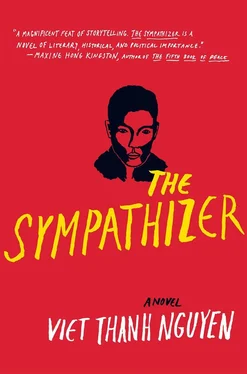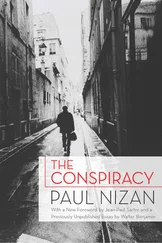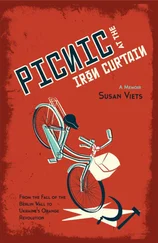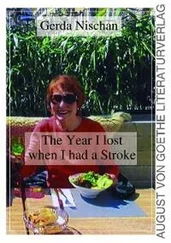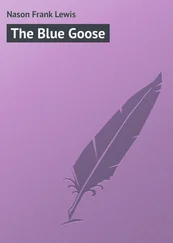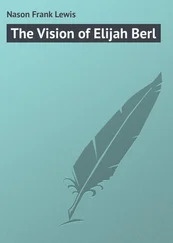Visible over Madame’s shoulder was a clock, hanging on the wall between a flag and a poster. The poster was for a new brand of beer, featuring three bikini-clad young women sprouting breasts the size and shape of children’s balloons; the flag was of the defeated Republic of Vietnam, three bold red horizontal stripes on a vivid field of yellow. This was the flag, as the General had noted more than once to me, of the free Vietnamese people. I had seen the flag countless times before, and posters like that one often, but I had never seen this type of clock, carved from hardwood into the shape of our homeland. For this clock that was a country, and this country that was a clock, the minute and hour hands pivoted in the south, the numbers of the dial a halo around Saigon. Some craftsman in exile had understood that this was exactly the timepiece his refugee countrymen desired. We were displaced persons, but it was time more than space that defined us. While the distance to return to our lost country was far but finite, the number of years it would take to close that distance was potentially infinite. Thus, for displaced people, the first question was always about time: When can I return?
Speaking of punctuality, I said to Madame, your clock is set to the wrong time.
No, she said, rising to fetch the beer. It’s set to Saigon time.
Of course it was. How could I not have seen it? Saigon time was fourteen hours off, although if one judged time by this clock, it was we who were fourteen hours off. Refugee, exile, immigrant — whatever species of displaced human we were, we did not simply live in two cultures, as celebrants of the great American melting pot imagined. Displaced people also lived in two time zones, the here and the there, the present and the past, being as we were reluctant time travelers. But while science fiction imagined time travelers as moving forward or backward in time, this timepiece demonstrated a different chronology. The open secret of the clock, naked for all to see, was that we were only going in circles.
After lunch, I debriefed the General and Madame on my Philippine adventures, which simultaneously lightened their gloominess and heightened their sense of resentment. Resentment was an antidote to gloominess, as it was for sadness, melancholy, despair, etc. One way to forget a certain kind of pain was to feel another kind of pain, as when the doctor examining you for mandatory military service (an exam that you never fail, unless you are afflicted by wealth) slaps you on one butt cheek while injecting you in the other cheek. The one thing I did not tell the General and Madame — besides myself nearly meeting the fate of one of those roasted ducks hung from its anus in the neighboring Chinese eatery’s window — was that I had been paid compensation for my near butchering. The morning after the extras had come bearing gifts, I had received two other visitors, Violet and a tall, thin white man in a powder-blue suit, his paisley tie as fat as Elvis Presley and his shirt the rich yellow color of urine after a meal of asparagus. How do you feel? she asked. All white, I whispered, although I could speak perfectly fine. She looked at me suspiciously and said, We’re all concerned about you. He wanted you to know he would have come himself but President Marcos is visiting the set today.
He who did not need to be named was, of course, the Auteur. I merely nodded, sagely and sadly, and said, I understand, though the mere mention of him infuriated me. This is the best hospital in Manila, the man in the suit said, flashing a searchlight of a smile onto my face. We all want the best possible care for you. How are you feeling? To tell you the truth, I said, proceeding to lie, I feel terrible. What a shame, he said. Let me introduce myself. He produced a pristine white business card with edges so sharp I feared a paper cut. I am a representative for the film studio. We want you to know we are paying all the bills for your hospital care.
What happened?
You don’t remember? Violet asked.
An explosion. A lot of explosions.
It was an accident. I have the report here, said the representative, lifting a liver-colored briefcase high enough for me to see its gleaming gold buckles. Such efficiency! I skimmed the report. Its details were not as significant as what its existence proved, that fast work of this type, as in our homeland, was only possible by an application of grease to the palms.
Am I lucky to be alive?
Extremely lucky, he said. You have your life, your well-being, and a check in my briefcase for the sum of five thousand dollars. According to the medical reports I’ve seen, you suffered smoke inhalation, some scrapes and bruises, a few mild burns, a bump on your head, and a concussion. Nothing broken, nothing ruptured, nothing permanent. But the studio wants to ensure that all your needs are met. The representative opened the briefcase and produced a stapled document of white papers and a long slip of green paper, the check. Of course, you will have to sign a receipt, as well as this document releasing the studio from any future obligations.
Was five thousand dollars the worth of my miserable life? Admittedly it was a considerable amount, more than I had ever seen at any one time. That was what they were counting on, but even in my dazed state, I knew better than to settle for the first offer. Thank you for this generous pledge, I said. It is decent of the studio to worry on my behalf, to be so concerned with me. But as you may know, or maybe you do not, I am my extended family’s principal support. Five thousand dollars is wonderful if I thought only of myself, but an Asian — here I paused and allowed a faraway look to come into my eyes, the better to give them time to imagine the vast genealogical banyan tree extending above me, overshadowing me with the oppressive weight of generations come to root on the top of my head — an Asian cannot think just about himself.
So I’ve heard, said the representative. The family is everything. Like us Italians.
Yes, you Italians! The Asian must think of his mother, his father. His siblings, his grandparents. His cousins, his village. If word got out of my good luck. . it would be endless. The favors. The requests for fifty dollars here, a hundred dollars there. Hands tugging at me from all directions. I could not decline. So you see the situation I find myself in. It would be better to take none of the money. I would spare myself these emotional hardships. Or the alternative. To have enough money to take care of all those favors as well as myself.
The representative waited for me to continue, but I waited for him to reply. At last he gave in and said, Not being aware of the complications of Asian families, I am also not aware of the appropriate sum that might satisfy all your familial obligations, which I understand are important to your culture, and which I respect greatly.
I waited for him to continue, but he waited for me to reply. I cannot be certain, I said. But although without certainty, I believe twenty thousand dollars would suffice. To satisfy any needs of my relatives. Anticipated and unanticipated.
Twenty thousand dollars? The representative’s eyebrows performed a graceful yoga pose, arching their backs in disturbingly steep concern. Oh, if you only knew the actuarial charts as I know them! For twenty thousand dollars you must lose at least a finger or, preferably, a larger appendage. If we are speaking of less visible matters, a vital organ or one of your five senses will do.
But in fact, ever since I had awoken from the explosion, something had been nagging at me that I could not name, an itch that was not physical. Now I knew what it was — I had forgotten something, but what that something was, I did not know. Of the three types of forgetting, this was the worst. To know what one had forgotten was common, as was the case with dates of history, mathematical formulas, and people’s names. To forget without knowing one has forgotten must be even more common, or maybe less, but it is merciful: in this case one cannot realize what is lost. But to know that one has forgotten something without knowing what that something was made me shudder. I have lost something, I said, pain getting the better of me and making itself audible in my voice. I’ve lost a piece of my mind.
Читать дальше
